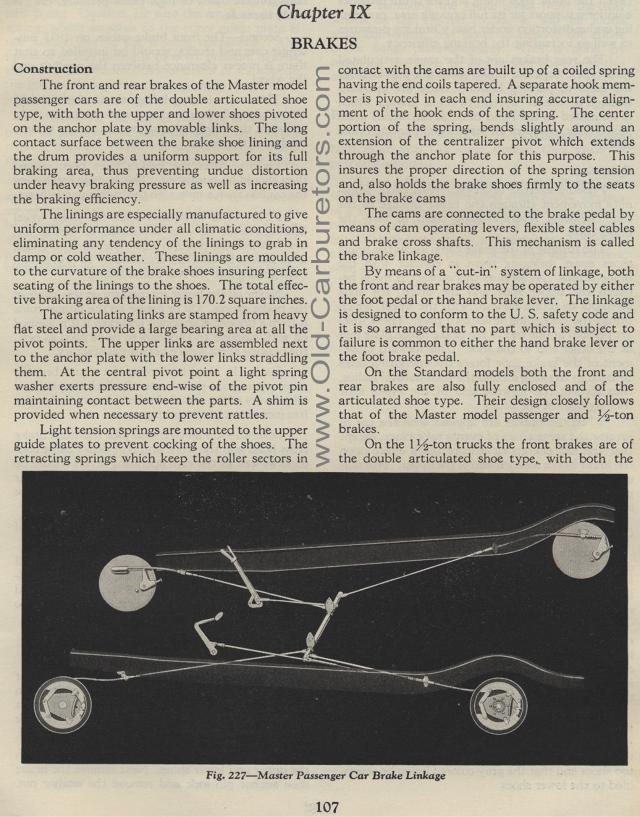Skip to: site menu | section menu | main content
1935 Chevy BRAKES
Construction
The front and rear brakes of the Master model
passenger cars are
of the double articulated shoe type, with both the upper and lower
shoes pivoted on the anchor plate by movable links.
The long contact
surface between the brake shoe lining and the drum provides a uniform
support for its full braking area, thus preventing undue distortion
under heavy braking pressure as well as increasing the braking
efficiency.
The linings are especially manufactured to give uniform performance
under all climatic conditions, eliminating any tendency of the
linings to grab in damp or cold weather. These linings are moulded
to the curvature of the brake shoes insuring perfect seating of
the linings to the shoes. The total effective braking area of the
lining is 170.2 square inches.
The articulating links are stamped from heavy flat steel and provide
a large bearing area at all the pivot points. The upper links are
assembled next to the anchor plate with the lower links straddling
them. At the central pivot point a light spring washer exerts pressure
end-wise of the pivot pin maintaining contact between the parts.
A shim is provided when necessary to prevent rattles.
Light tension springs are mounted to the upper guide plates to
prevent cocking of the shoes. The retracting springs which keep
the roller sectors incontact with the cams are built up of a coiled
spring having the end coils tapered. A separate hook member is
pivoted in each end insuring accurate alignment of the hook ends
of the spring. The center portion of the spring, bends slightly
around an extension of the centralizer pivot which extends through
the anchor plate for this purpose. This insures the proper direction
of the spring tension and, also holds the brake shoes firmly to
the seats on the brake cams
The cams are connected to the brake pedal by means of cam operating
levers, flexible steel cables and brake cross shafts. This mechanism
is called the brake linkage.
By means of a "cut-in" system of linkage, both the front
and rear brakes may be operated by either the foot pedal or the
hand brake lever. The linkage is designed to conform to the U.
S. safety code and it is so arranged that no part which is subject
to failure is common to either the hand brake lever or the foot
brake pedal.
On the Standard models both the front and rear
brakes are also fully enclosed and of the articulated shoe type.
Their design closely follows that of the Master model passenger
and 1/2 ton brakes.
On the 1-ton trucks the front brakes are of the double articulated
shoe type, with both the
Fig. 227— Master Passenger Car Brake Linkage
